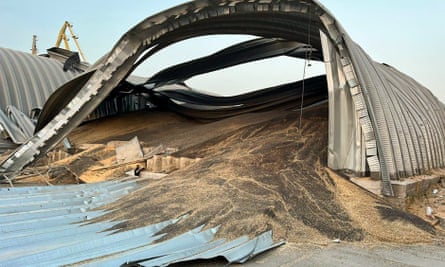The Turkish president will attempt to persuade Vladimir Putin to re-enter the Black Sea grain deal that he quit two months ago claiming the west was not keeping its side of the bargain covering Russian food and fertiliser exports.
Recep Tayyip Erdoğan, the chief negotiator behind the initial deal signed in July 2022, has not met the Russian president face to face since the deal collapsed. The immediate backdrop to the meeting in Sochi, Russia, on Monday was another Russian drone strike on a Ukrainian grain-exporting port that damaged warehouses and set buildings on fire.
Russian drones have been systematically attacking Ukrainian grain stores since Moscow’s withdrawal from the deal and the latest attack on the Danube River port of Izmail in Ukraine’s southern Odesa region hit warehouses and production buildings. More than 220,000 tonnes of Ukrainian grain have been destroyed in the Russian assaults, Ukraine says.
It is the first in-person meeting between the two leaders since October, and if wider peace talks do ever start, Erdoğan is likely to be a leading intermediary.

Erdoğan’s chief foreign policy and security adviser, Akif Çağatay Kılıç, said in advance of the meeting: “We play a leading role here. The current status [of the grain deal] will be discussed at the summit on Monday. We are cautious, but we hope to achieve success.”
“I know that you intend to raise the issue of the grain deal,” Putin told Erdoğan at the start of the meeting. “We are open to negotiations on this question.”
Erdoğan replied: “Everyone is waiting for what will come out of our meeting today.”
The Turkish foreign minister, Hakan Fidan, earlier said it was a “process that tries to better understand Russia’s position and requests, and to meet them. “There are many issues ranging from financial transactions to insurance.”
The west says it has already issued comprehensive guidance to underline the wide exemptions in its sanctions against Russia’s food exports and had previously tried to reassure Putin that Russian grain and fertiliser exports were not subject to western sanctions.
Russia exported 56m tonnes of grain products under the Black Sea grain deal, earning $41bn in the process, the west claims. But Moscow said in practice that continued restrictions on payments, logistics and insurance had hindered shipments, leaving western undertakings unfulfilled.
Moscow also wants the Russian Agricultural Bank to be reconnected to the Swift international payments system. The west cut off the bank in June 2022 as part of sanctions imposed in response to the invasion, but the restrictions do not apply to new debt or equity.
The Kremlin is also keen to restart a critical ammonia pipeline that runs to Pivdennyi in the Odesa region, something US and European officials are increasingly open to should Kyiv allow it, given ammonia’s role as a key fertiliser ingredient.
The disputes, involving complex detail, have become a significant propaganda battleground as Russia and the west seek to convince poorer countries and the more powerful Brics nations that blame for the resulting inflation and grain shortages lies with their opponent.
As a sweetener Russia has offered to supply up to 1m tonnes of Russian grain to Turkey at reduced prices for subsequent processing at Turkish plants and shipping to countries most in need. Inflation in Turkey is at 60%, not helped by food prices.
Before the suspension, the deal brought nearly 33m tonnes of grain exports to global markets, with well over half of that grain and two-thirds of the wheat reaching developing countries. The US claims approximately 20m tonnes of that grain went to developing countries. Russia’s contribution to fighting world food hunger is questionable since it is a distant 34th largest contributor to the UN World Food Programme even as it expects a record harvest.
The deal focused on allowing commercial food and fertiliser (including ammonia) exports from three key Ukrainian ports in the Black Sea – Odesa, Chornomorsk and Pivdennyi (formerly known as Yuzhny).
A joint coordination centre was established to monitor the implementation of the initiative. The JCC is hosted in Istanbul and includes representatives from Russia, Turkey, Ukraine and the United Nations. The UN acts as the centre’s secretariat.
Ukrainian vessels guided cargo ships into international waters of the Black Sea, avoiding mined areas. The vessels then proceeded towards Istanbul along the agreed maritime humanitarian corridor. Ships heading to and from the Ukrainian ports were inspected by JCC teams comprising Russian, Turkish, Ukrainian and UN inspectors. At their peak in October, the number of inspections reached an average of 10.6 a day.
Since the collapse of the deal, Ukraine has sent three commercial shipments of grain out of the Black Sea without Russian permission along new humanitarian corridors. Moscow has threatened to attack the ships but has not yet done so.
Land routes through Poland that could be used to export grain are more expensive, carry less grain and take longer.

